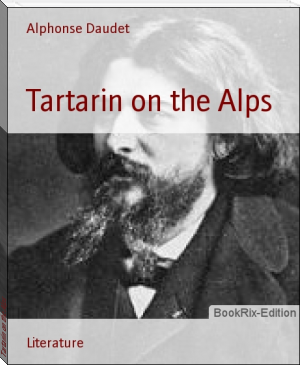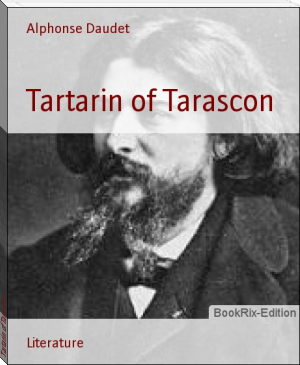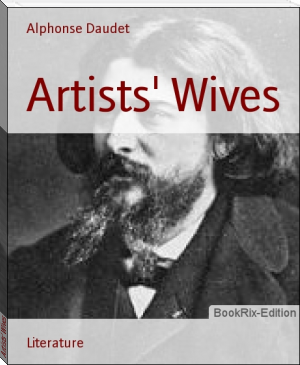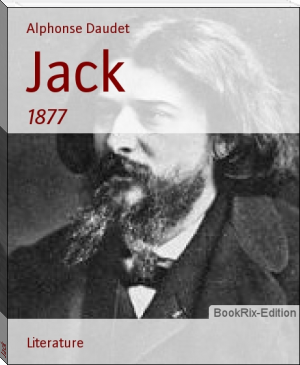Tartarin on the Alps by Alphonse Daudet (best classic books TXT) 📕

- Author: Alphonse Daudet
Book online «Tartarin on the Alps by Alphonse Daudet (best classic books TXT) 📕». Author Alphonse Daudet
The old fellow howled in terror and plunged into the crowd, his trembling plume remaining visible above their serried heads. None the less, Tartarin felt that he must put it somewhere, that ball. "_Te! pardi!_ as we did at Tarascon!.." And the former cap-hunter pitched his headgear high into the air with all the strength of his double muscles, shot it on the fly, and pierced it. "Bravo!" cried Sonia, sticking into the small hole made by the ball the bouquet of cyclamen with which she had stroked her cheek.
With that charming trophy in his cap Tartarin returned to the landau. The trumpet sounded, the convoy started, the horses went rapidly down to Brienz along that marvellous corniche road, blasted in the side of the rock, separated from an abyss of over a thousand feet by single stones a couple of yards apart. But Tartarin was no longer conscious of danger; no longer did he look at the scenery--that Meyringen valley, seen through a light veil of mist, with its river in straight lines, the lake, the villages massing themselves in the distance, and that whole horizon of mountains, of glaciers, blending at times with the clouds, displaced by the turns of the road, lost apparently, and then returning, like the shifting scenes of a stage.
Softened by tender thoughts, the hero admired the sweet child before him, reflecting that glory is only a semi-happiness, that 'tis sad to grow old all alone in your greatness, like Moses, and that this fragile flower of the North transplanted into the little garden at Tarascon would brighten its monotony, and be sweeter to see and breathe than that everlasting baobab, _arbos gigantea_, diminutively confined in the mignonette pot. With her childlike eyes, and her broad brow, thoughtful and self-willed, Sonia looked at him, and she, too, dreamed--but who knows what the young girls dream of?
VII.
The nights at Tarascon, Where is he? Anxiety. The
grasshoppers on the promenade call for Tartarin. Martyrdom
of a great Tarasconese saint. The Club of the Alpines. What
was happening at the pharmacy. "Help! help! Bezuquet!"
"A letter, Monsieur Bezuquet!.. Comes from Switzerland, _ve!_.. Switzerland!" cried the postman joyously, from the other end of the little square, waving something in the air, and hurrying along in the coming darkness.
The apothecary, who took the air, as they say, of an evening before his door in his shirt-sleeves, gave a jump, seized the letter with feverish hands and carried it into his lair among the varied odours of elixirs and dried herbs, but did not open it till the postman had departed, refreshed by a glass of that delicious _sirop de cadavre_ in recompense for what he brought.
Fifteen days had Bezuquet expected it, this letter from Switzerland, fifteen days of agonized watching! And here it was. Merely from looking at the cramped and resolute little writing on the envelope, the postmark "Interlaken" and the broad purple stamp of the "Hotel Jungfrau, kept by Meyer," the tears filled his eyes, and the heavy moustache of the Barbary corsair through which whispered softly the idle whistle of a kindly soul, quivered.
"_Confidential. Destroy when read._" Those words, written large at the head of the page, in the telegraphic style of the pharmacopoeia ("external use; shake before using") troubled him to the point of making him read aloud, as one does in a bad dream: "_Fearful things are happening to me_..." In the salon beside the pharmacy where she was taking her little nap after supper, Mme. Bezuquet, _mere_, might hear him, or the pupil whose pestle was pounding its regular blows in the big marble mortar of the laboratory. Bezuquet continued his reading in a low voice, beginning it over again two or three times, very pale, his hair literally standing on end. Then, with a rapid look about him, _cra cra_... and the letter in a thousand scraps went into the waste-paper basket; but there it might be found, and pieced together, and as he was stooping to gather up the fragments a quavering voice called to him:
"_Ve!_ Ferdinand, are you there?" "Yes, mamma," replied the unlucky corsair, curdling with fear, the whole of his long body on its hands and knees beneath the desk. "What are you doing, my treasure?" "I am... h'm, I am making Mile. Tournatoire's eye-salve."
Mamma went to sleep again, the pupil's pestle, suspended for a moment, began once more its slow clock movement, while Bezuquet walked up and down before his door in the deserted little square, turning pink or green according as he passed before one or other of his bottles. From time to time he threw up his arms, uttering disjointed words: "Unhappy man!.. lost... fatal love... how can we extricate him?" and, in spite of his trouble of mind, accompanying with a lively whistle the bugle "taps" of a dragoon regiment echoing among the plane-trees of the Tour de Ville.
"_He!_ good night, Bezuquet," said a shadow hurrying along in the ash-coloured twilight.
"Where are you going, Pegoulade?"
"To the Club, _pardi!_.. Night session... they are going to discuss Tartarin and the presidency... You ought to come."
"_Te!_ yes, I 'll come..." said the apothecary vehemently, a providential idea darting through his mind. He went in, put on his frock-coat, felt in its pocket to assure himself that his latchkey was there, and also the American tomahawk, without which no Tarasconese whatsoever would risk himself in the streets after "taps." Then he called: "Pascalon!.. Pascalon!.." but not too loudly, for fear of waking the old lady.
Almost a child, though bald, wearing all his hair in his curly blond beard, Pascalon the pupil had the ardent soul of a partizan, a dome-like forehead, the eyes of crazy goat, and on his chubby cheeks the delicate tints of a shiny crusty Beaucaire roll. On all the grand Alpine excursions it was to him that the Club entrusted its banner, and his childish soul had vowed to the P. C. A. a fanatical worship, the burning, silent adoration of a taper consuming itself before an altar in the Easter season.
"Pascalon," said the apothecary in a low voice, and so close to him that the bristle of his moustache pricked his ear. "I have news of Tartarin... It is heart-breaking..."
Seeing him turn pale, he added:
"Courage, child! all can be repaired... _Differemment_ I confide to you the pharmacy... If any one asks you for arsenic, don't give it; opium, don't give that either, nor rhubarb... don't give anything. If I am not in by ten o'clock, lock the door and go to bed."
With intrepid step, he plunged into the darkness, not once looking back, which allowed Pascalon to spring at the waste-paper basket, turn it over and over with feverish eager hands and finally tip out its contents on the leather of the desk to see if no scrap remained of the mysterious letter brought by the postman.
To those who know Tarasconese excitability, it is easy to imagine the frantic condition of the little town after Tartarin's abrupt disappearance. _Et autrement, pas moins, differemment_, they lost their heads, all the more because it was the middle of August and their brains boiled in the sun till their skulls were fit to crack. From morning till night they talked of nothing else; that one name "Tartarin" alone was heard on the pinched lips of the elderly ladies in hoods, in the rosy mouths of grisettes, their hair tied up with velvet ribbons:
"Tartarin, Tartarin..." Even among the plane-trees on the Promenade, heavy with white dust, distracted grasshoppers, vibrating in the sunlight, seemed to strangle with those two sonorous syllables: "Tar.. tar.. tar.. tar.. tar..."
As no one knew anything, naturally every one was well-informed and gave explanations of the departure of the president. Extravagant versions appeared. According to some, he had entered La Trappe; he had eloped with the Dugazon; others declared he had gone to the Isles to found a colony to be called Port-Tarascon, or else to roam Central Africa in search of Livingstone.
"Ah! _vai!_ Livingstone!.. Why he has been dead these two years."
But Tarasconese imagination defies all hints of time and space. And the curious thing is that these ideas of La Trappe, colonization, distant travel, were Tartarin's own ideas, dreams of that sleeper awake, communicated in past days to his intimate friends, who now, not knowing what to think, and vexed in their hearts at not being duly informed, affected toward the public the greatest reserve and behaved to one another with a sly air of private understanding. Excourbanies suspected Bravida of being in the secret; Bravida, on his side, thought: "Bezuquet knows the truth; he looks about him like a dog with a bone."
True it was that the apothecary suffered a thousand deaths from this hair-shirt of a secret, which cut him, skinned him, turned him pale and red in the same minute and caused him to squint continually. Remember that he belonged to Tarascon, unfortunate man, and say if, in all martyrology, you can find so terrible a torture as this--the torture of Saint Bezuquet, who knew a secret and could not tell it.
This is why, on that particular evening, in spite of the terrifying news he had just received, his step had something, I hardly know what, freer, more buoyant, as he went to the session of the Club. _Enfin!_.. He was now to speak, to unbosom himself, to tell that which weighed so heavily upon him; and in his haste to unload his breast he cast a few half words as he went along to the loiterers on the Promenade. The day had been so hot, that in spite of the unusual hour (_a quarter to eight_ on the clock of the town hall!) and the terrifying darkness, quite a crowd of reckless persons, bourgeois families getting the good of the air while that of their houses evaporated, bands of five or six sewing-women, rambling along in an undulating line of chatter and laughter, were abroad. In every group they were talking of Tartarin.
"_Et autrement_, Monsieur Bezuquet, still no letter?" they asked of the apothecary, stopping him on his way.
"Yes, yes, my friends, yes, there is... Read the _Forum_ to-morrow morning..."
He hastened his steps, but they followed him, fastened on him, and along the Promenade rose a murmuring sound, the bleating of a flock, which gathered beneath the windows of the Club, left wide open in great squares of light.
The sessions were held in the _bouillotte_ room, where the long table covered with green cloth served as a desk. At the centre, the presidential arm-chair, with P. C. A. embroidered on the back of it; at one end, humbly, the armless chair of the secretary. Behind, the banner of the Club, draped above a long glazed map in relief, on which the Alpines stood up with their respective names and altitudes. Alpenstocks of honour, inlaid with ivory, stacked like billiard cues, ornamented the corners, and a glass-case displayed curiosities, crystals, silex, petrifactions, two porcupines and a salamander, collected on the mountains.
In Tartarin's absence, Costecalde, rejuvenated and radiant, occupied the presidential arm-chair; the armless chair was for Excourbanies, who fulfilled the functions of secretary; but that devil of a man, frizzled, hairy, bearded, was incessantly in need of noise, motion, activity which hindered his sedentary employments. At the smallest pretext, he threw out his arms and legs, uttered fearful howls and "Ha! ha! has!" of ferocious, exuberant joy which always ended with a war-cry in the Tarasconese patois: "_Fen de brut_... let us make a noise "... He was called "the gong" on account of his metallic voice, which cracked the ears of his friends with its ceaseless explosions.
Here and there, on a horsehair
With that charming trophy in his cap Tartarin returned to the landau. The trumpet sounded, the convoy started, the horses went rapidly down to Brienz along that marvellous corniche road, blasted in the side of the rock, separated from an abyss of over a thousand feet by single stones a couple of yards apart. But Tartarin was no longer conscious of danger; no longer did he look at the scenery--that Meyringen valley, seen through a light veil of mist, with its river in straight lines, the lake, the villages massing themselves in the distance, and that whole horizon of mountains, of glaciers, blending at times with the clouds, displaced by the turns of the road, lost apparently, and then returning, like the shifting scenes of a stage.
Softened by tender thoughts, the hero admired the sweet child before him, reflecting that glory is only a semi-happiness, that 'tis sad to grow old all alone in your greatness, like Moses, and that this fragile flower of the North transplanted into the little garden at Tarascon would brighten its monotony, and be sweeter to see and breathe than that everlasting baobab, _arbos gigantea_, diminutively confined in the mignonette pot. With her childlike eyes, and her broad brow, thoughtful and self-willed, Sonia looked at him, and she, too, dreamed--but who knows what the young girls dream of?
VII.
The nights at Tarascon, Where is he? Anxiety. The
grasshoppers on the promenade call for Tartarin. Martyrdom
of a great Tarasconese saint. The Club of the Alpines. What
was happening at the pharmacy. "Help! help! Bezuquet!"
"A letter, Monsieur Bezuquet!.. Comes from Switzerland, _ve!_.. Switzerland!" cried the postman joyously, from the other end of the little square, waving something in the air, and hurrying along in the coming darkness.
The apothecary, who took the air, as they say, of an evening before his door in his shirt-sleeves, gave a jump, seized the letter with feverish hands and carried it into his lair among the varied odours of elixirs and dried herbs, but did not open it till the postman had departed, refreshed by a glass of that delicious _sirop de cadavre_ in recompense for what he brought.
Fifteen days had Bezuquet expected it, this letter from Switzerland, fifteen days of agonized watching! And here it was. Merely from looking at the cramped and resolute little writing on the envelope, the postmark "Interlaken" and the broad purple stamp of the "Hotel Jungfrau, kept by Meyer," the tears filled his eyes, and the heavy moustache of the Barbary corsair through which whispered softly the idle whistle of a kindly soul, quivered.
"_Confidential. Destroy when read._" Those words, written large at the head of the page, in the telegraphic style of the pharmacopoeia ("external use; shake before using") troubled him to the point of making him read aloud, as one does in a bad dream: "_Fearful things are happening to me_..." In the salon beside the pharmacy where she was taking her little nap after supper, Mme. Bezuquet, _mere_, might hear him, or the pupil whose pestle was pounding its regular blows in the big marble mortar of the laboratory. Bezuquet continued his reading in a low voice, beginning it over again two or three times, very pale, his hair literally standing on end. Then, with a rapid look about him, _cra cra_... and the letter in a thousand scraps went into the waste-paper basket; but there it might be found, and pieced together, and as he was stooping to gather up the fragments a quavering voice called to him:
"_Ve!_ Ferdinand, are you there?" "Yes, mamma," replied the unlucky corsair, curdling with fear, the whole of his long body on its hands and knees beneath the desk. "What are you doing, my treasure?" "I am... h'm, I am making Mile. Tournatoire's eye-salve."
Mamma went to sleep again, the pupil's pestle, suspended for a moment, began once more its slow clock movement, while Bezuquet walked up and down before his door in the deserted little square, turning pink or green according as he passed before one or other of his bottles. From time to time he threw up his arms, uttering disjointed words: "Unhappy man!.. lost... fatal love... how can we extricate him?" and, in spite of his trouble of mind, accompanying with a lively whistle the bugle "taps" of a dragoon regiment echoing among the plane-trees of the Tour de Ville.
"_He!_ good night, Bezuquet," said a shadow hurrying along in the ash-coloured twilight.
"Where are you going, Pegoulade?"
"To the Club, _pardi!_.. Night session... they are going to discuss Tartarin and the presidency... You ought to come."
"_Te!_ yes, I 'll come..." said the apothecary vehemently, a providential idea darting through his mind. He went in, put on his frock-coat, felt in its pocket to assure himself that his latchkey was there, and also the American tomahawk, without which no Tarasconese whatsoever would risk himself in the streets after "taps." Then he called: "Pascalon!.. Pascalon!.." but not too loudly, for fear of waking the old lady.
Almost a child, though bald, wearing all his hair in his curly blond beard, Pascalon the pupil had the ardent soul of a partizan, a dome-like forehead, the eyes of crazy goat, and on his chubby cheeks the delicate tints of a shiny crusty Beaucaire roll. On all the grand Alpine excursions it was to him that the Club entrusted its banner, and his childish soul had vowed to the P. C. A. a fanatical worship, the burning, silent adoration of a taper consuming itself before an altar in the Easter season.
"Pascalon," said the apothecary in a low voice, and so close to him that the bristle of his moustache pricked his ear. "I have news of Tartarin... It is heart-breaking..."
Seeing him turn pale, he added:
"Courage, child! all can be repaired... _Differemment_ I confide to you the pharmacy... If any one asks you for arsenic, don't give it; opium, don't give that either, nor rhubarb... don't give anything. If I am not in by ten o'clock, lock the door and go to bed."
With intrepid step, he plunged into the darkness, not once looking back, which allowed Pascalon to spring at the waste-paper basket, turn it over and over with feverish eager hands and finally tip out its contents on the leather of the desk to see if no scrap remained of the mysterious letter brought by the postman.
To those who know Tarasconese excitability, it is easy to imagine the frantic condition of the little town after Tartarin's abrupt disappearance. _Et autrement, pas moins, differemment_, they lost their heads, all the more because it was the middle of August and their brains boiled in the sun till their skulls were fit to crack. From morning till night they talked of nothing else; that one name "Tartarin" alone was heard on the pinched lips of the elderly ladies in hoods, in the rosy mouths of grisettes, their hair tied up with velvet ribbons:
"Tartarin, Tartarin..." Even among the plane-trees on the Promenade, heavy with white dust, distracted grasshoppers, vibrating in the sunlight, seemed to strangle with those two sonorous syllables: "Tar.. tar.. tar.. tar.. tar..."
As no one knew anything, naturally every one was well-informed and gave explanations of the departure of the president. Extravagant versions appeared. According to some, he had entered La Trappe; he had eloped with the Dugazon; others declared he had gone to the Isles to found a colony to be called Port-Tarascon, or else to roam Central Africa in search of Livingstone.
"Ah! _vai!_ Livingstone!.. Why he has been dead these two years."
But Tarasconese imagination defies all hints of time and space. And the curious thing is that these ideas of La Trappe, colonization, distant travel, were Tartarin's own ideas, dreams of that sleeper awake, communicated in past days to his intimate friends, who now, not knowing what to think, and vexed in their hearts at not being duly informed, affected toward the public the greatest reserve and behaved to one another with a sly air of private understanding. Excourbanies suspected Bravida of being in the secret; Bravida, on his side, thought: "Bezuquet knows the truth; he looks about him like a dog with a bone."
True it was that the apothecary suffered a thousand deaths from this hair-shirt of a secret, which cut him, skinned him, turned him pale and red in the same minute and caused him to squint continually. Remember that he belonged to Tarascon, unfortunate man, and say if, in all martyrology, you can find so terrible a torture as this--the torture of Saint Bezuquet, who knew a secret and could not tell it.
This is why, on that particular evening, in spite of the terrifying news he had just received, his step had something, I hardly know what, freer, more buoyant, as he went to the session of the Club. _Enfin!_.. He was now to speak, to unbosom himself, to tell that which weighed so heavily upon him; and in his haste to unload his breast he cast a few half words as he went along to the loiterers on the Promenade. The day had been so hot, that in spite of the unusual hour (_a quarter to eight_ on the clock of the town hall!) and the terrifying darkness, quite a crowd of reckless persons, bourgeois families getting the good of the air while that of their houses evaporated, bands of five or six sewing-women, rambling along in an undulating line of chatter and laughter, were abroad. In every group they were talking of Tartarin.
"_Et autrement_, Monsieur Bezuquet, still no letter?" they asked of the apothecary, stopping him on his way.
"Yes, yes, my friends, yes, there is... Read the _Forum_ to-morrow morning..."
He hastened his steps, but they followed him, fastened on him, and along the Promenade rose a murmuring sound, the bleating of a flock, which gathered beneath the windows of the Club, left wide open in great squares of light.
The sessions were held in the _bouillotte_ room, where the long table covered with green cloth served as a desk. At the centre, the presidential arm-chair, with P. C. A. embroidered on the back of it; at one end, humbly, the armless chair of the secretary. Behind, the banner of the Club, draped above a long glazed map in relief, on which the Alpines stood up with their respective names and altitudes. Alpenstocks of honour, inlaid with ivory, stacked like billiard cues, ornamented the corners, and a glass-case displayed curiosities, crystals, silex, petrifactions, two porcupines and a salamander, collected on the mountains.
In Tartarin's absence, Costecalde, rejuvenated and radiant, occupied the presidential arm-chair; the armless chair was for Excourbanies, who fulfilled the functions of secretary; but that devil of a man, frizzled, hairy, bearded, was incessantly in need of noise, motion, activity which hindered his sedentary employments. At the smallest pretext, he threw out his arms and legs, uttered fearful howls and "Ha! ha! has!" of ferocious, exuberant joy which always ended with a war-cry in the Tarasconese patois: "_Fen de brut_... let us make a noise "... He was called "the gong" on account of his metallic voice, which cracked the ears of his friends with its ceaseless explosions.
Here and there, on a horsehair
Free e-book «Tartarin on the Alps by Alphonse Daudet (best classic books TXT) 📕» - read online now
Similar e-books:





Comments (0)